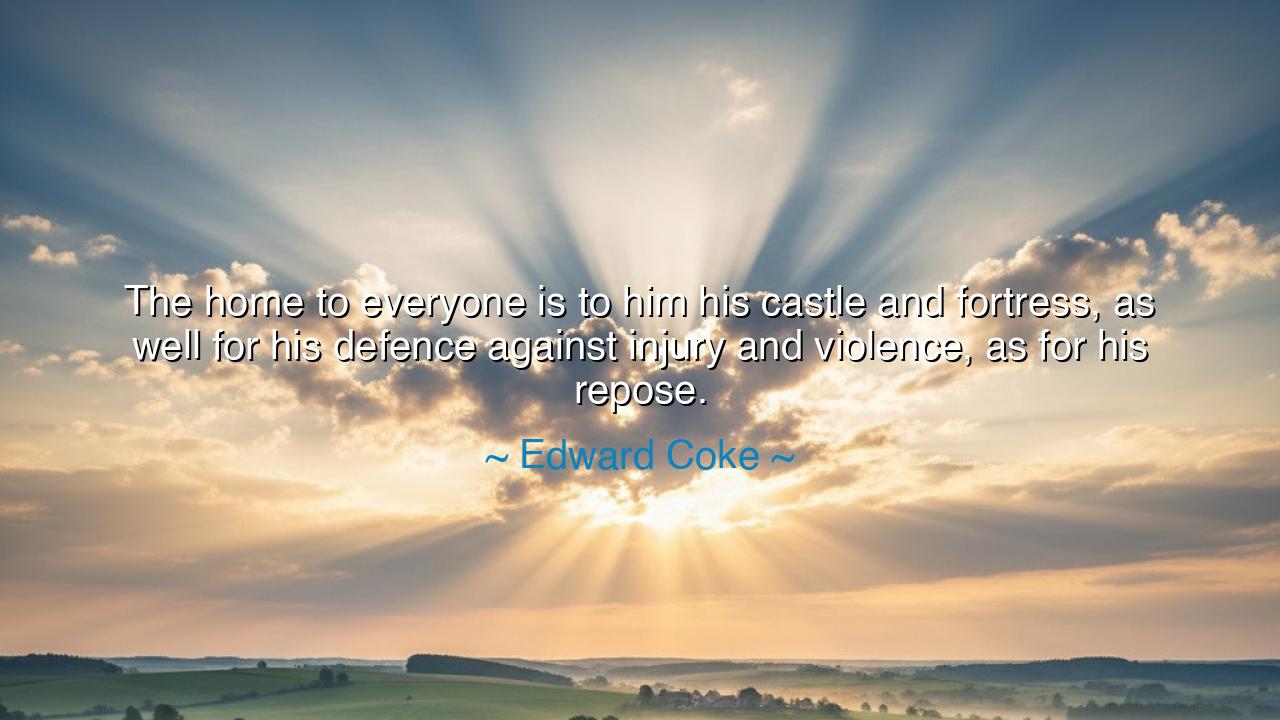
The home to everyone is to him his castle and fortress, as well
The home to everyone is to him his castle and fortress, as well for his defence against injury and violence, as for his repose.






“The home to everyone is to him his castle and fortress, as well for his defence against injury and violence, as for his repose.” Thus wrote Sir Edward Coke, one of the great jurists of England, a guardian of liberty in an age when kings still believed that law was their servant. These words, spoken more than four centuries ago, echo with enduring power — for they are not only a legal declaration, but a moral truth. In them lies the recognition that the home is sacred — both a fortress of protection and a sanctuary of peace. Coke’s insight reaches beyond the courtroom, into the heart of what it means to live as a free and dignified being.
In the turbulent seventeenth century, when kings claimed the divine right to enter any dwelling and rule over every man’s life, Coke stood as a defender of the common person. He declared that even the humblest cottage had its sovereign: the man or woman who dwelt within. His famous phrase — “A man’s home is his castle” — became the cornerstone of English law and later of all nations that inherited its spirit. No monarch, no officer, no stranger, he said, has the right to cross that threshold without consent. Thus, the home became more than a building of brick and timber; it became the embodiment of freedom, a small kingdom where one’s will reigns supreme.
Yet Coke, in this quote, speaks not only of defence, but also of repose. The home is not merely a wall against violence, but a haven where the soul may find rest. It is both shield and sanctuary — a place where one can lay down the burdens of the day and be renewed by the quiet rhythm of familiar things. The ancient peoples built fortresses of stone to keep enemies at bay, but every human heart also seeks a softer fortress — one built of warmth, affection, and safety. In that double nature of the home lies its mystery: it protects both the body and the spirit.
Consider the story of William Penn, the founder of Pennsylvania, who carried Coke’s principle across the sea to the New World. In a time of persecution, he established a colony where no man’s home or conscience would be violated. “Freedom,” he said, “is maintained by the sanctity of the dwelling.” And so it was that from this ancient English ideal — that the home is one’s castle — grew the American right to privacy, the belief that within one’s doors, a person may think, speak, and rest unafraid. Across centuries and nations, this idea became the silent guardian of liberty, protecting the weak from the mighty, the individual from the state.
But there is a wisdom even deeper in Coke’s words — one that reaches beyond law into the moral order of life itself. The home is not only a fortress against outer danger; it is also a fortress against inner chaos. It is within its walls that we learn virtue, patience, forgiveness, and love. It is the training ground of the soul. When a home is peaceful, it strengthens the heart; when it is broken, it weakens the world. Every quarrel mended at the hearth, every kindness offered across a table, is an act of preservation — not only of a family, but of civilization itself. For nations are but vast households, and the peace of the great world begins with the peace of small rooms.
Let us also remember that repose — the rest of the spirit — is not idleness but restoration. The home must be a place where one can lay down the armor of survival and remember what it means to be human. In a world that grows ever noisier, where men carry their struggles even into their sleep, the home remains the one place where silence becomes sacred, where the weary can draw breath and the wounded can heal. Without such places of stillness, no fortress of law or army of men can preserve the heart from despair.
Lesson: Defend the sanctity of your home — not merely from intrusion, but from indifference. Let it be a castle where kindness rules, a fortress of safety for those who enter, and a sanctuary where love is the law. Guard its peace as fiercely as a knight guards his keep, for in protecting your home, you protect your soul. Build within it an atmosphere of comfort, of trust, of rest — for in doing so, you uphold the very principle that Edward Coke fought to enshrine: that the home is the last and truest refuge of human dignity.
So remember, as you close your door at night, that you stand at the gate of something sacred. The world may rage and kingdoms may fall, but within your home lies your realm — a place of peace, of freedom, and of repose. Honor it. Tend it. And in its quiet strength, you will find the fortress of your own heart.






AAdministratorAdministrator
Welcome, honored guests. Please leave a comment, we will respond soon